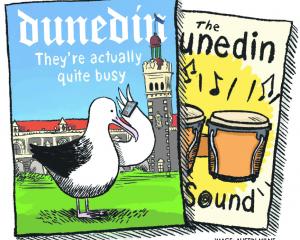
Cr Kevin Malcolm said by leaving the meeting a quorum of six councillors present in the room was lost.
He added he had "had enough of being told what I have to believe in".
The Otago Regional Council said in a media advisory yesterday the council held the emergency meeting behind closed doors on Wednesday.
At the meeting, councillors re-appointed interim chief executive Pim Borren from March 1 to May 31.
Councillors also approved the appointment of Richard Saunders as chief executive from June 1, it said.
Minutes posted to the council website said the meeting was adjourned for 10 minutes after Cr Malcolm left to allow another councillor, chairwoman Gretchen Robertson, to physically join the meeting so the quorum could be regained.
When the Otago Daily Times asked for comment from all councillors, it became clear not all of them immediately knew Cr Malcolm’s walk-out was a protest, or what it was about.
Not all, but most backed the use of the opening karakia.
Cr Robertson, who did not chair the meeting on Wednesday, said she expected a formal discussion on karakia use soon.
Cr Malcolm, a Moeraki constituency councillor, said he made the trip down to Dunedin for the meeting to ensure council had a quorum.
"I left because the deputy chair, Lloyd McCall, began the meeting with a karakia," he said.
"I probably could say it was a protest, but it wasn’t on the agenda. I was there to do council business that was on the agenda.
"I was not there to listen to his beliefs.
"I’m actually just sick of it.
"I’ve had enough of being told what I have to believe in.
"If you want a partnership, the best way for you to ruin a partnership is to give one party of the partnership greater benefits."
Karakia as openings had not been the norm at the council, he said.
"Absolutely not. They have been imposed on us by the chair — this term.
"We have had no council debate or discussion."
Cr Robertson said in previous terms it was common for the council to use karakia in meetings where there was iwi participation.
"This triennium some chairs are choosing to start their meetings with a karakia."
Under standing orders there were options for opening or closing a meeting, including karakia.
"There is no mandate. It is currently over to the individual chair how they choose to introduce and close a meeting and we respect individual approaches."
Cr McCall said he was not aware at the time why Cr Malcolm left the meeting. He confirmed the karakia he used was one that had been offered by Kai Tahu for the council’s use.
"I will always defend my desire to recognise mana whenua at the start of meetings with the use of te reo Māori.
"As a council we are working hard to continue to build our partnership with mana whenua."
Karakia was now a normal practice for those involved in other organisations, Cr Tim Mepham said.
"It is a reflective way to start a meeting, particularly if it is also translated."
Cr Alexa Forbes said she appreciated the karakia the council had been offered by Kai Tahu.
"The opening karakia asks us to unite and to listen to the environment.
"The closing one brings us back together, acknowledging that our work is finished and that peace should settle on us.
"I don’t see anything about belief in these words, nor anything to even dislike — and we have been provided with translations."
Cr Elliot Weir said they were out of town and not at the meeting, but karakia was an important way to demonstrate commitment to Te Tiriti o Waitangi and "recognise the whenua we work on".
"I’m not sure why Cr Malcolm has chosen this occasion to walk out of a meeting but it sounded more like a petty tantrum than a protest," Cr Weir said.
Cr Gary Kelliher said he supported Cr Malcolm.
"ORC priorities seem to be heading totally away from core business and instead wanting pomp and ceremony to factor in every meeting.
"Whether it’s karakia, or prayer or Chinese proverb, the issues for Otago are substantial and the meetings are short."
Cr Michael Laws said karakia were "imposed upon council and councillors" without formal discussion, debate or resolution.
"There should be a clear distinction between religious and secular matters in local government and, in this case, a spiritual element has been imposed that does not belong.
"At best, it’s misguided wokery.
"At worst, it is insulting tokenism."












